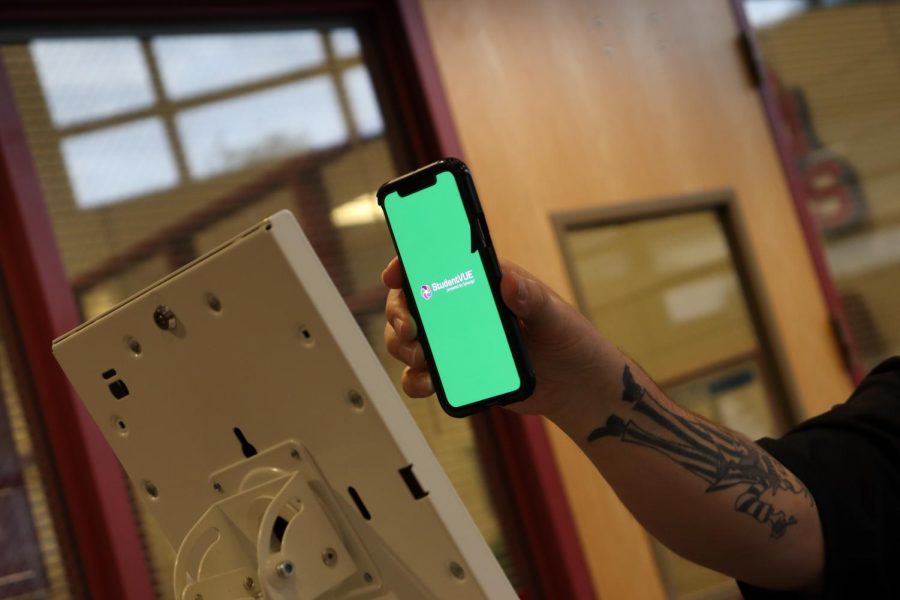Never tardy to the Patriot… dance?
Millard South enacts new Homecoming attendance guidelines
A student uses the Synergy ID at the morning tardy check in line. Students can only have 10 tardies to school and classes in order to maintain good standing to attend Homecoming.
Oct 19, 2022
It is now Millard South’s turn at cracking down on students for their tardies and failing grades, with new guidelines introduced by administrators that will disallow students from attending dances that are not in “good standing” with the school.
The guidelines released in August stated that in order to purchase tickets and attend Homecoming or Prom, a student must pass a minimum of four classes, attend school 90 percent of the time, and have fewer than 10 tardies to school or classes.
“I feel like the rules are a little harsh,” sophomore Jameson Rayner said. “I know a lot of kids who have a hard time making it to school, maybe because they get sick a lot or do a lot outside of school. I know some good kids who have a hard time passing classes too.”
That sentiment was something shared by many members of the student body, as more questions arose about the specifics of these new rules. When asked why these new rules were applied, Assistant Principal Michaela Wragge said, “Our good kids don’t cause problems, but the few that aren’t doing what they’re supposed to be doing ruin it for everyone, and that’s unfortunate,” she said.
The notion that school dances in our building are a privilege rather than a right seemed to be enforced, with Wragge adding, “We don’t have to have our own homecoming dance. We don’t have to have our own prom dance, and we want those that are there to have an amazing time and have fun. And so again, like what we’ve talked about with the hall pass, those that follow the rules will have no problem,” she said
Regarding the reasoning for the exact number of days we are allowed to miss, Wragge said, “We counted down the number of days from Aug. 17 to the homecoming dance, which is Oct. 8, and that’s 33 days. And we said you could miss four, so we rounded up, just because I wasn’t looking for 3.3 days, which kind of falls really nice, because anything over four for attendance purposes anyway, you’re supposed to have a doctor’s note for it to be excused. So if you are really sick for four days in a row, obviously there’s something going on. And I think it comes down to that communication piece, but also for passing classes. Again, that’s why we’re here, for your education,” she said.
In general, unexcused absences and tardies are the main targets of the guidelines, so excused extracurricular activities, long-term sicknesses, and other reasons for missing school that are communicated to administration will not count against a student.
On tardy logistics, Wragge brought up the fact that anywhere from 400 to 700 students get to class on time with no tardies that are invited to the Patriot Party, and that “We’re not saying no tardies, because we get things happen in the parking lot or on the way to school, but hopefully, by the time people get into the building, they’re on time.”
Wragge acknowledged that absences are easier to calculate than tardies. “The tardy part is going to take us some time to really look at because we pulled before school tardies, but then we pulled during school tardies, and they’re two completely different reports. So it’s a lot of data digging on our part, but we really do feel it’s valuable.”
Wragge said a successful dance is one that feels like a reward for each student. “…It’s beautiful, I mean, you guys spend hours on homecoming, and JCB spends hours on prom, and we just want those events to be as special as they really are and memorable, and I think this is what we’re hoping to get from that.”



